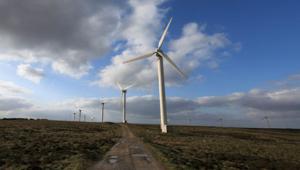By Vivienne Russell | 6 June 2013
Communities in England are to be given a greater say over the siting of on-shore wind farms along with bigger incentives to ensure such developments are built, the government announced today.
Under new planning guidance, renewable energy objectives will not be allowed to automatically override local planning concerns. Communities will be consulted earlier in the planning application process and the visual impact of wind farms and the effect on the local landscape will be given greater weight in the planning framework.
The amount developers have to pay the community will also increase from £1,000 per megawatt capacity to £5,000. Communities agreeing to the installation of a wind farm could, therefore, gain a package of benefits worth £100,000 per year, or up to £400 a year off the average affected household’s annual domestic fuel bill.
Developers and communities would work together to determine how these extra funds could be spent, whether in fuel bill discounts, energy efficiency works, local training projects or building community amenities.
The move follows a government consultation on how wind farm developers could better engage with communities and share with them the economic benefits of onshore wind energy.
Communities Secretary Eric Pickles said: ‘We want to give local communities a greater say on planning, to give greater weight to the protection of landscape, heritage and local amenity.’
Ed Davey, the energy and climate change secretary, added: ‘It is important that onshore wind is developed in a way that is truly sustainable – economically, environmentally and socially, and today’s announcement will ensure that communities see the windfall from hosting developments near to them, not just the wind farm.’
Davey added that the government remained committed to using diverse and low-carbon energy sources. He said wind energy was an ‘important sector’ that was helping drive economic growth and providing new jobs.
But Maria McCaffrey, chief executive of RenewableUK, which represents wind and marine power firms, said the extra requirements could now make some planned schemes too expensive to progress.
‘Developing wind farms requires a significant amount of investment to be made upfront,’ she said.
‘Adding to this cost, by following the government’s advice that we should pay substantially more into community funds for future projects, may unfortunately make some onshore wind energy developments uneconomic in England, so they will not go ahead and that is very disappointing.’





















